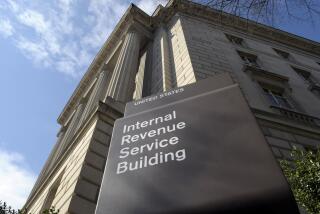America’s Burden Today Is Taxation Because of Representation : Taxes: More revenue doesn’t result in better lives. Government can’t create real prosperity and real jobs.
- Share via
Our tolerance for taxes has increased significantly from colonial days when we demanded “no taxation without representation” to independence when we achieved “taxation with representation” to our present plight of “taxation because of representation.”
Government leaders tell us they need to spend more money to stimulate the economy and create jobs. However, I’ve never understood why a dollar spent by government is any better than the dollar that we might spend, if it didn’t go for taxes. The President has proposed an annual federal spending level of $1.5 trillion; but tax revenues are expected to total “only” $1.2 trillion. That’s some gap--a $300-billion deficit growing almost $1 billion every day.
The news out of Washington is not good. We know that the highest tax rate will be raised soon from 31% to 36% on the very wealthy.
Our representatives ignore history when they assume that they can collect more money simply by raising the tax rate. “For some reason unknown to politicians, people don’t work to pay taxes. People will work to avoid paying taxes, and if necessary will stop working to avoid paying taxes,” says economist Arthur Laffer.
Studies at the Hoover Institution by senior fellow John Cogan, and recent analysis by San Francisco investment adviser Kurt Hauser, show clearly that no matter how high or low the top tax rate, the amount of federal taxes actually collected over recent decades does not deviate much from 19.5% of gross national product. That should tell us to set spending at the level of tax tolerance, but the federal government spends 23% of GNP.
A good measure of tax tolerance is the rate of compliance by taxpayers. The “tax gap”--the amount owed to government but not paid--is steadily increasing, from $63 billion in 1982 to the present level of about $110 billion. A major activity of my fellow “enrolled agents” (who are qualified to appear before the tax courts) is negotiating payment schedules with the Internal Revenue Service on behalf of clients who cannot now pay their outstanding tax liabilities. In many cases, the taxpayer is willing but unable to pay.
Today, the average family of four pays 24% of their salary in federal taxes. In 1948, they paid 2%. The heavily burdened taxpayer in 1993 will not be much amused to learn that during the legislative debate in 1913 leading up to the 16th Amendment (income tax), Congress promised that the top tax rate would never exceed 10%.
If there were any connection between the amount of taxes paid and the degree to which we could achieve better lives for the less fortunate, maybe we would be more tolerant of the tax collector’s work. But, alas, we all know that the chief beneficiaries are the politicians and the bureaucrats who run the programs.
As Thomas Jefferson wrote, “The natural progress of things is for government to gain ground and for liberty to yield.” We should learn from modern history the painful lesson that former communist societies have learned: Government cannot create real prosperity and real jobs.
More to Read
Sign up for Essential California
The most important California stories and recommendations in your inbox every morning.
You may occasionally receive promotional content from the Los Angeles Times.










